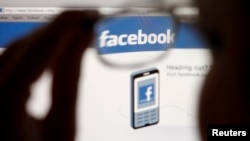Social media giant Facebook has solidified its online relationship with Africa in the most old-fashioned way: by opening its first brick-and-mortar African headquarters in Johannesburg.
Facebook representatives gathered this week in the African economic hub to herald the move, which will see the website open a new office in an upscale part of the city. Company representatives say they hope it will bring new users to the site and expand opportunities for users and businesses.
The company has reached out to Africa in recent years by introducing a lighter version of its app for lower-end phones and by debuting “missed call ads” that allow users to click on an ad and then receive a free call from the advertiser.
Facebook also has made a play for widespread, free Internet access — a challenge in Africa, where just over a tenth of the continent’s 1 billion people are active on the network. In a bid to lure more users, Facebook has partnered with mobile phone companies to offer free airtime for phone users accessing Facebook and other selected sites. A project was recently launched in the southern African nation of Angola.
The move to Africa has a clear business approach, with Facebook officials touting testimonials from small-business owners from across the continent who say the platform has helped them flourish.
Representatives from the company noted that they couldn’t disclose many details about its plans in Africa, because it is entering its “quiet period,” during which corporate insiders are restricted by U.S. Securities and Exchange Commission rules from discussing certain information before it becomes public.
The move, said the company’s head of public policy, Ebele Okobi, is not likely to cause any sudden changes for the continent’s 120 million users.
Okobi told VOA News in Johannesburg that the company’s motives are far from complicated.
“We want to learn more about Africa, and we also want to serve consumers as well as businesses across the continent,” she said. “ … So, learning more about consumers in Nigeria, learning more about consumers in South Africa, and being able to evolve our product and our platform so it serves those consumers’ needs — I would say that is the No. 1 thing we would get.”
The site also plays a pivotal role in African society and politics, Okobi said.
“You have NGOs who are using Facebook to bring transparency, so you have [it] in Nigeria, which was using it during the Nigerian elections to bring transparency to the electoral process,” she said. Politicans "were using it to connect directly with citizens.”
Analyst James Kassaga Arinaitwe predicted in an editorial that the social media site could bring about a “digital renaissance” in Africa.
“Access to mobile technologies and a free Internet will give our youths energy and excitement to test, innovate and push their limits,” he said. “ … A digital renaissance could be a gateway to a democratic revolution in Africa, simply because timely and reliable information has the power to transform lives and the way people make political, business and personal decisions.”
Actions like that have periodically brought the company into governments’ crosshairs. Egyptian authorities blocked Facebook for a few days during the nation’s 2011 social media-driven uprising. Even the tiny island nation of Mauritius blocked the site in 2007 after a fake account popped up purporting to be from the prime minister.
A scathing political page under the name of “Baba Jukwa” has drawn the ire of Zimbabwean authorities, who arrested a top journalist and his brother in 2014 on suspicion they ran that Facebook page, although both men deny the charges.
It is a delicate balance, Okobi said.
“That is an issue that all social media companies face, and all social media companies grapple with, and it is one that we will continue to,” she said. “So we work with consumers to understand more about how they are using the platform to engage and to express themselves freely. But we also have to work directly with governments to understand more about the laws that regulate media in their particular country.”
The power of Facebook is clear and pervasive. Okobi said some users in Africa use the site to tell stories about the continent that are not often portrayed in mainstream media. She noted, however, that many African users are not very different from their American or European counterparts; they use the site to share news and photos of important milestones and beloved family members, to air ruminations and witticisms both weighty and meaningless, and to connect with people far and near.
That was seen at the site’s launch in Johannesburg, where one South African attendee told VOA News he briefly tuned out to attend to some pressing online business. He was looking at pictures of his baby, he said, on Facebook.
